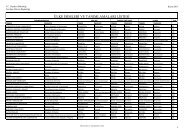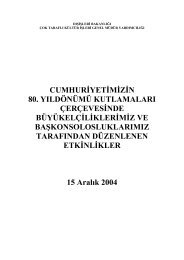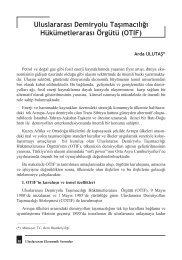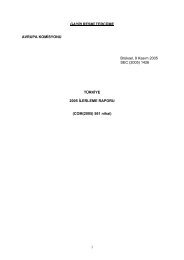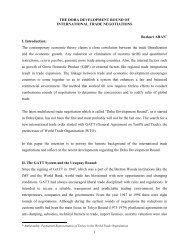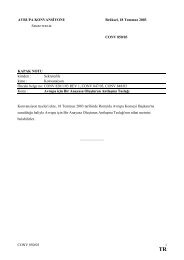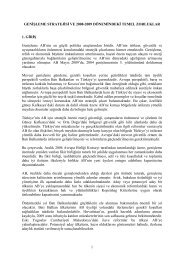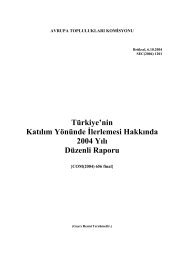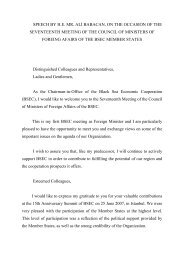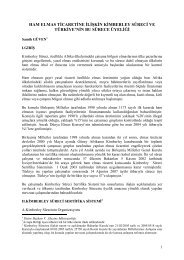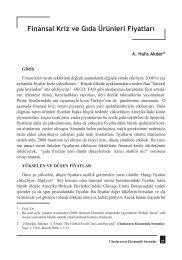ULUSLARARASI EKONOMİK SORUNLAR
ULUSLARARASI EKONOMİK SORUNLAR
ULUSLARARASI EKONOMİK SORUNLAR
Create successful ePaper yourself
Turn your PDF publications into a flip-book with our unique Google optimized e-Paper software.
N. Tolga TUNCER<br />
sensitive products can be converted into special products with a certain ratio. Regarding<br />
the special safeguard mechanism, Turkey aspires that the trigger threshold levels which<br />
will allow the mechanism to be used are low and there are no time and product limits<br />
for the utilisation of the mechanism.<br />
EU, on the other hand, demands an ambitious market opening in agricultural<br />
products and hence demands the opposite of almost all what Turkey demands. EU<br />
especially aims at significant market access commitments by developing members and<br />
intends that flexibilities to developing countries are kept to a minimum. In this sense,<br />
EU has the view that special products should constitute at most 8% of the tariff lines<br />
and that no product should be exempted from tariff reductions.<br />
4.1.3. Export Competition<br />
Export competition – agricultural export subsidies- is a less controversial issue since<br />
much has already been agreed. As agreed upon in the Hong Kong Ministerial Conference<br />
in 2005, agricultural export subsidies are to be eliminated by 2013 for developed<br />
countries and the corresponding date for developing countries is to be determined<br />
within the negotiations (currently 2016). EU, which intensively used this measure<br />
especially before the conclusion of Uruguay Round, had already accepted to give up<br />
using this measure and had made the necessary reforms in the CAP. Turkey also has no<br />
objection to the elimination of export subsidies except for demanding longer transitional<br />
periods for developing countries.<br />
On export financing –or export credits- which is also treated under the export<br />
competition heading, EU demands that the repayment term which is the critical issue is<br />
180 days regardless of being a developing or a developed member. On the other hand,<br />
Turkey believes that repayment term should be at least 360 days for developing<br />
members.<br />
4.1.4. An Overall Assessment of Agriculture Negotiations and Turkey’s<br />
Position<br />
An overall assessment of Turkey’s position in Agriculture Negotiations requires a<br />
longer term look at the possibilities and challenges in front of Turkey’s agricultural<br />
sector and not to be stuck with the short term political concerns. Turkey is in the<br />
accession process to the EU. When Turkey becomes a full member, naturally it will<br />
have to extend the customs union to the agricultural products and apply the common<br />
external tariff of EU in agricultural products as well. It seems this process is going to<br />
be a quite troublesome for Turkish agricultural sector: Even now, before any tariff<br />
Uluslararası Ekonomik Sorunlar 27



